7 Essential Strategies to Boost BDNF Supplement Effectiveness
Overview
This article outlines essential strategies to enhance the effectiveness of BDNF (brain-derived neurotrophic factor) supplements. It emphasizes the importance of dietary choices, exercise, and lifestyle habits. By detailing various nutrient-dense foods, such as omega-3 fatty acids and probiotics, alongside activities like aerobic exercise and social engagement, the article highlights how these factors can significantly boost BDNF levels. As a result, they promote cognitive health and mental well-being.
Furthermore, incorporating these strategies into daily routines can lead to improved overall health. Consider exploring nutrient-rich foods and engaging in regular physical activity to support your cognitive function. By making informed choices, you can harness the benefits of BDNF supplements effectively.
Introduction
Exploring the intricate relationship between brain health and brain-derived neurotrophic factor (BDNF) reveals a world of possibilities for enhancing cognitive function and emotional well-being. This article delves into seven essential strategies that not only boost the effectiveness of BDNF supplements but also integrate seamlessly into daily life. This holistic approach to mental wellness is vital for those seeking to improve their cognitive capabilities. However, the challenge remains: how can individuals effectively implement these strategies to maximize their brain health benefits?
ByKomi Nutritional Recipes: Enhance BDNF Levels with Brain-Boosting Meals
Incorporating brain-boosting meals into your diet can significantly enhance levels of the BDNF supplement, which are crucial for mental health. Here are some nutrient-dense recipes from ByKomi that focus on ingredients known to support brain function:
- Savory Beef Liver Patties: Rich in vitamins A and B12, these patties are essential for cognitive function and neurogenesis. Their high nutrient content helps combat cognitive decline associated with aging.
- Perfectly Seared Ribeye Steak: This dish offers high-quality protein and omega-3 fatty acids, both vital for sustaining overall brain function and promoting the production of the bdnf supplement.
- Berry Smoothie: A delightful blend of blueberries and spinach, this beverage is packed with antioxidants and flavonoids, serving as a natural bdnf supplement that enhances brain-derived neurotrophic factor levels and supports neuroplasticity.
- Extra Virgin Olive Oil Drizzle: Adding extra virgin olive oil not only boosts flavor but also acts as a BDNF supplement, aiding in the creation of brain-derived neurotrophic factor and contributing to improved cognitive function.
These recipes not only provide delightful flavors but also offer essential nutrients that support mental function as you age. To maximize these benefits, consider incorporating these meals into your daily diet for a brain-healthy lifestyle.
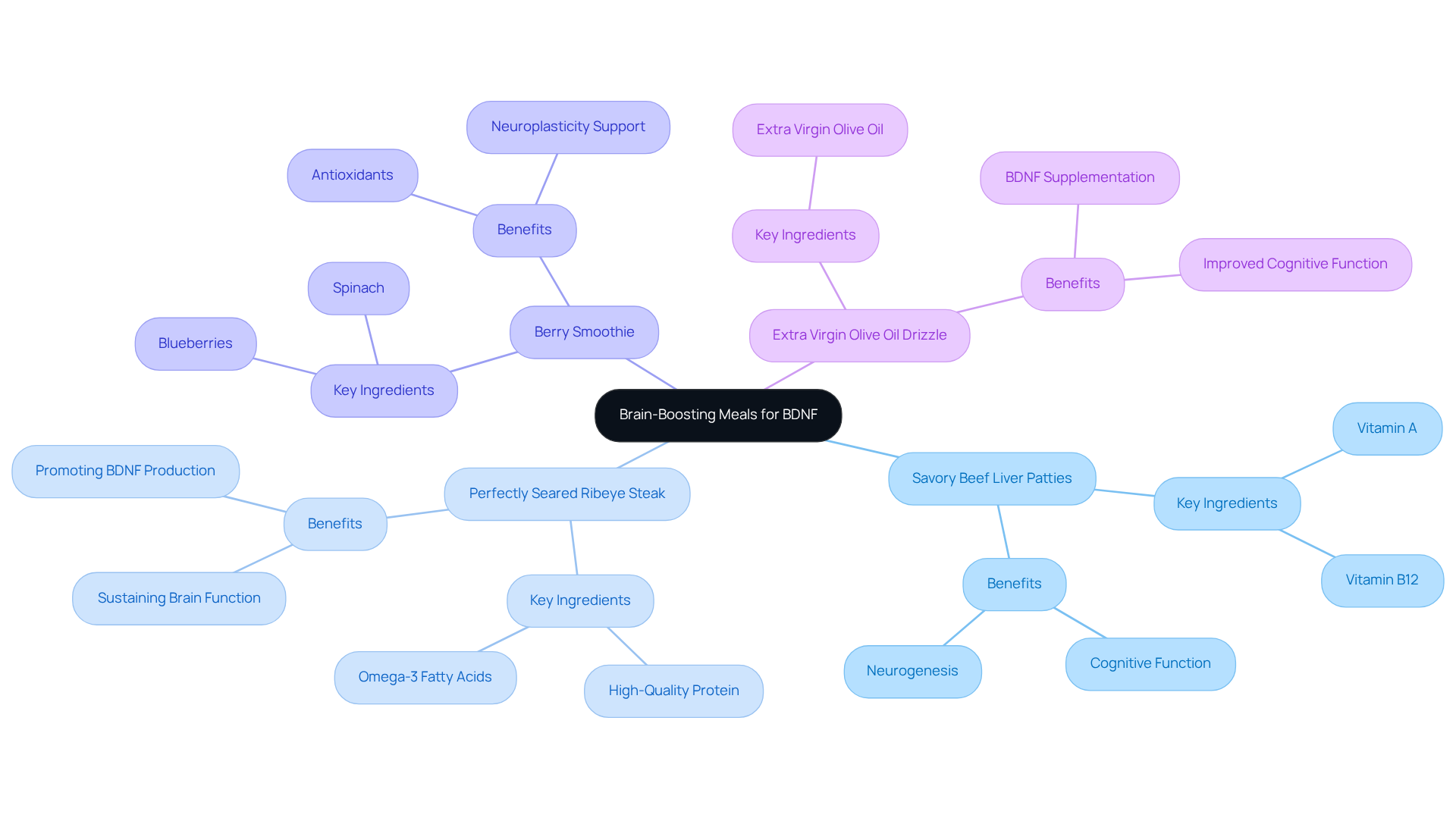
Neuroplasticity Support: CLOCK® Dietary Supplement for Boosting BDNF
The CLOCK® dietary supplement is notable as a significant enhancer of brain-derived neurotrophic factor (BDNF) levels, highlighting the importance of the BDNF supplement in any brain wellness routine. Research shows that taking a BDNF supplement with a daily dosage of 1000 mg can result in an impressive 27% increase in BDNF, which supports both cognitive function and mood. This supplement is particularly beneficial for those looking to boost their neuroplasticity and overall brain performance.
Are you seeking to improve your cognitive abilities? Incorporating CLOCK® into your daily regimen could be the solution. With its proven ability to elevate levels of the BDNF supplement, it not only supports your mental health but also fosters a more adaptable brain. Consider exploring this supplement further to enhance your brain health and functionality.
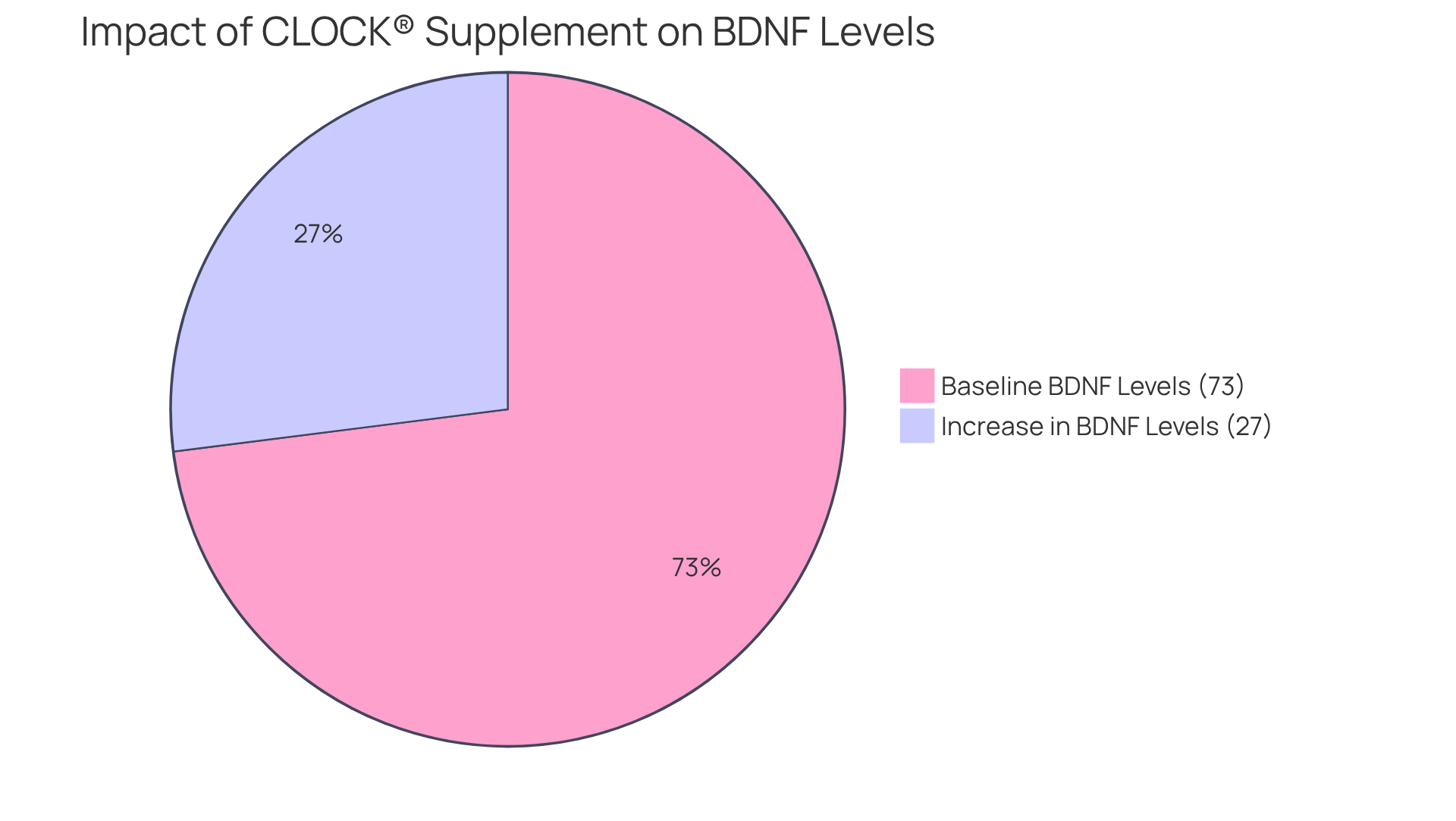
Aerobic Exercise: Proven Method to Elevate BDNF Levels
Participating in consistent aerobic activity is one of the most effective methods to increase levels of the bdnf supplement, which is essential for brain health. Research indicates that activities like running, cycling, and swimming can greatly enhance the production of the bdnf supplement in the brain. Aim for at least 150 minutes of moderate aerobic exercise each week to reap the cognitive benefits.
Significantly, while physical activity boosts brain-derived neurotrophic factor levels, studies show that no link was discovered between exercise intensity and alterations in resting brain-derived neurotrophic factor concentration among those reporting exercise intensity. This suggests that the duration of exercise may be more critical than its intensity. Additionally, the average difference in brain-derived neurotrophic factor concentration following a single session of high-intensity aerobic exercise was determined to be 2.49 ng/mL, whereas extended programs can result in an average rise of 3.42 ng/mL.
It’s also important to note that individual responses to exercise can vary based on factors such as age, gender, and physical fitness. As evidence suggests, physical activity, potentially enhanced by a bdnf supplement, confers cognitive benefits and can alleviate symptoms of psychiatric disorders in many individuals, making aerobic exercise a vital component of a healthy lifestyle.
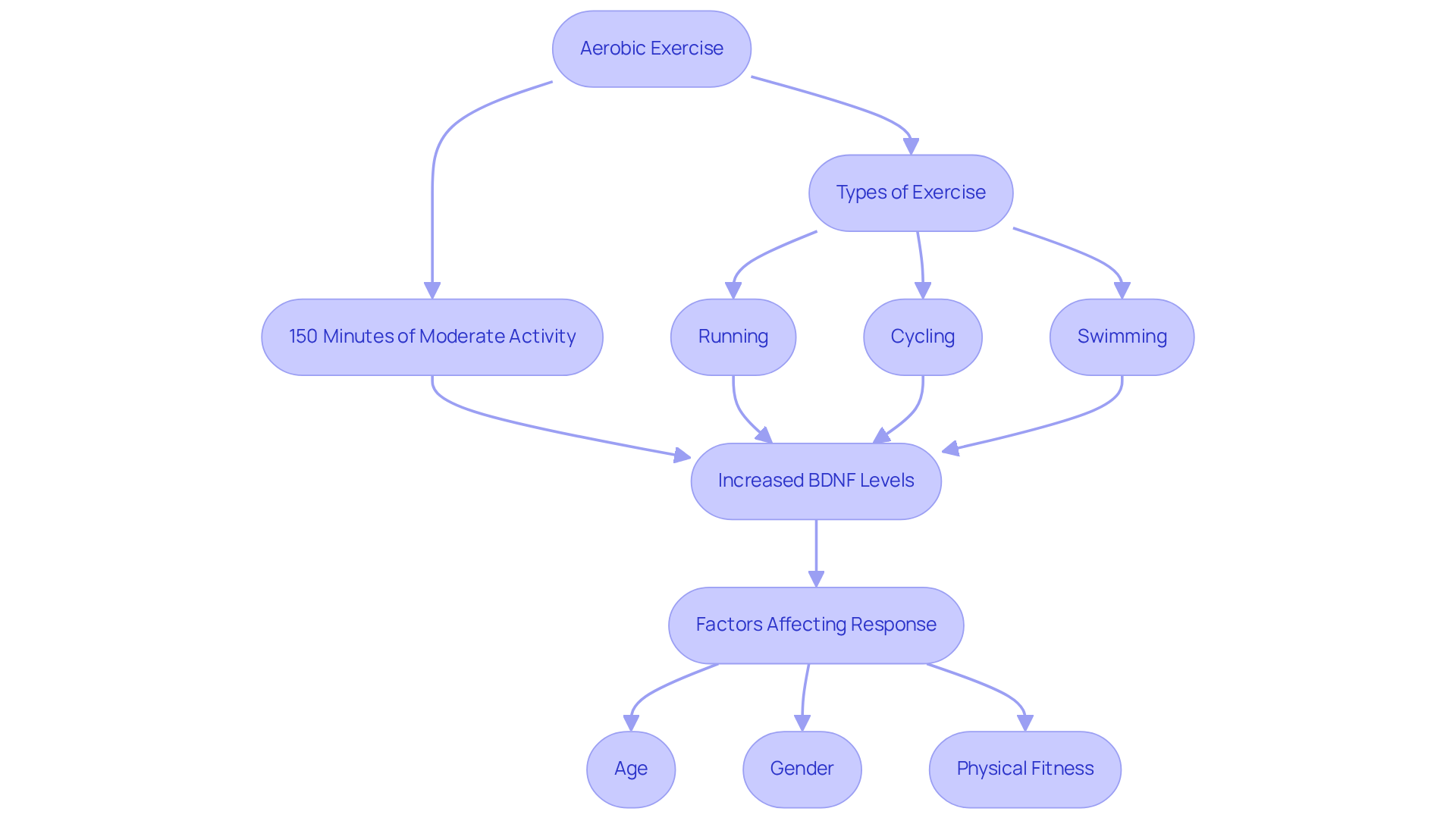
Omega-3 Fatty Acids: Essential Foods for Increasing BDNF
Including omega-3 fatty acids in your diet is essential for boosting brain-derived neurotrophic factor concentrations, which can be enhanced by a BDNF supplement for brain wellness. Research suggests that the use of a BDNF supplement, such as omega-3, can lead to a notable increase in brain-derived neurotrophic factor concentrations, with a pooled weighted mean difference of 1.01 μmol/L observed in studies. Foods rich in omega-3s include:
- Fatty Fish: Varieties such as salmon, mackerel, and sardines are excellent sources, providing essential fatty acids that support cognitive function and overall brain health. Based on a systematic analysis, the BDNF supplement significantly raised brain-derived neurotrophic factor concentrations compared to the control group (p=0.008).
- Chia Seeds: These tiny seeds are packed with omega-3s and can easily be added to smoothies or oatmeal, making them a versatile addition to your diet.
- Walnuts: A nutritious snack option, walnuts are rich in healthy fats and have been shown to effectively support brain function.
Furthermore, a recent study conducted in Palembang, Indonesia, demonstrated that long-term supplementation with a BDNF supplement and omega-3 PUFAs led to significant improvements in mental function among older adults with late-life depression, emphasizing the potential advantages of these foods.
To effectively incorporate these omega-3-rich foods into your diet, consider adding a serving of fatty fish to your meals a few times a week, sprinkling chia seeds on your breakfast, or enjoying a handful of walnuts as a snack. Consistent intake of these foods, along with a BDNF supplement, can assist in sustaining ideal brain-derived neurotrophic factor levels, enhancing mental wellness and potentially reducing age-related mental decline.
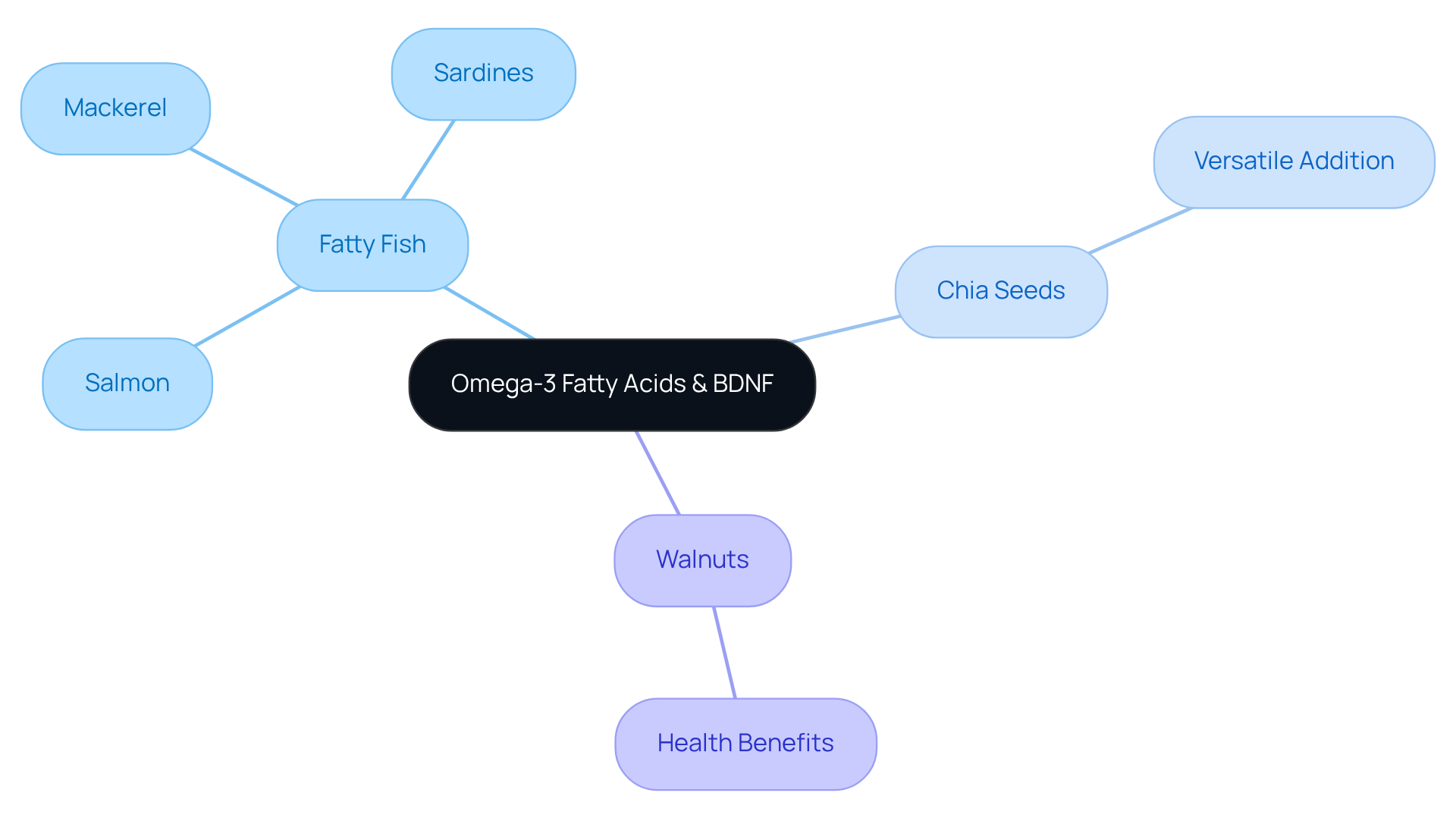
Probiotics: Gut Bacteria’s Role in Boosting BDNF Production
Probiotics play a crucial role in boosting the production of the BDNF supplement, primarily through their positive effects on gut health. A well-balanced gut microbiome is linked to increased concentrations of BDNF, which can be supported by a bdnf supplement, and are essential for neuroplasticity and cognitive function. Research indicates that probiotics, particularly strains like Lactobacillus and Bifidobacterium, can significantly enhance factors related to the bdnf supplement, especially in individuals with neurological conditions and depression. For instance, studies have shown that the levels of a specific neurotrophic factor in the probiotic group were substantially higher than in the placebo group, with a notable increase of 3.08 ng/mL in those with neurological conditions and 0.77 ng/mL in individuals experiencing depression.
To support gut health and elevate BDNF levels, consider incorporating the following probiotic-rich foods into your diet:
- Yogurt: Choose varieties containing live cultures to maximize benefits.
- Kefir: This fermented drink is rich in beneficial bacteria that promote gut health.
- Sauerkraut: Fermented cabbage not only aids digestion but also enhances the gut microbiome.
Integrating these foods into your daily meals can foster a healthier gut environment, leading to increased production of the BDNF supplement and improved mental function. However, it is essential to highlight that further large-scale, high-quality randomized controlled trials are necessary to confirm the effectiveness of probiotics in boosting BDNF.
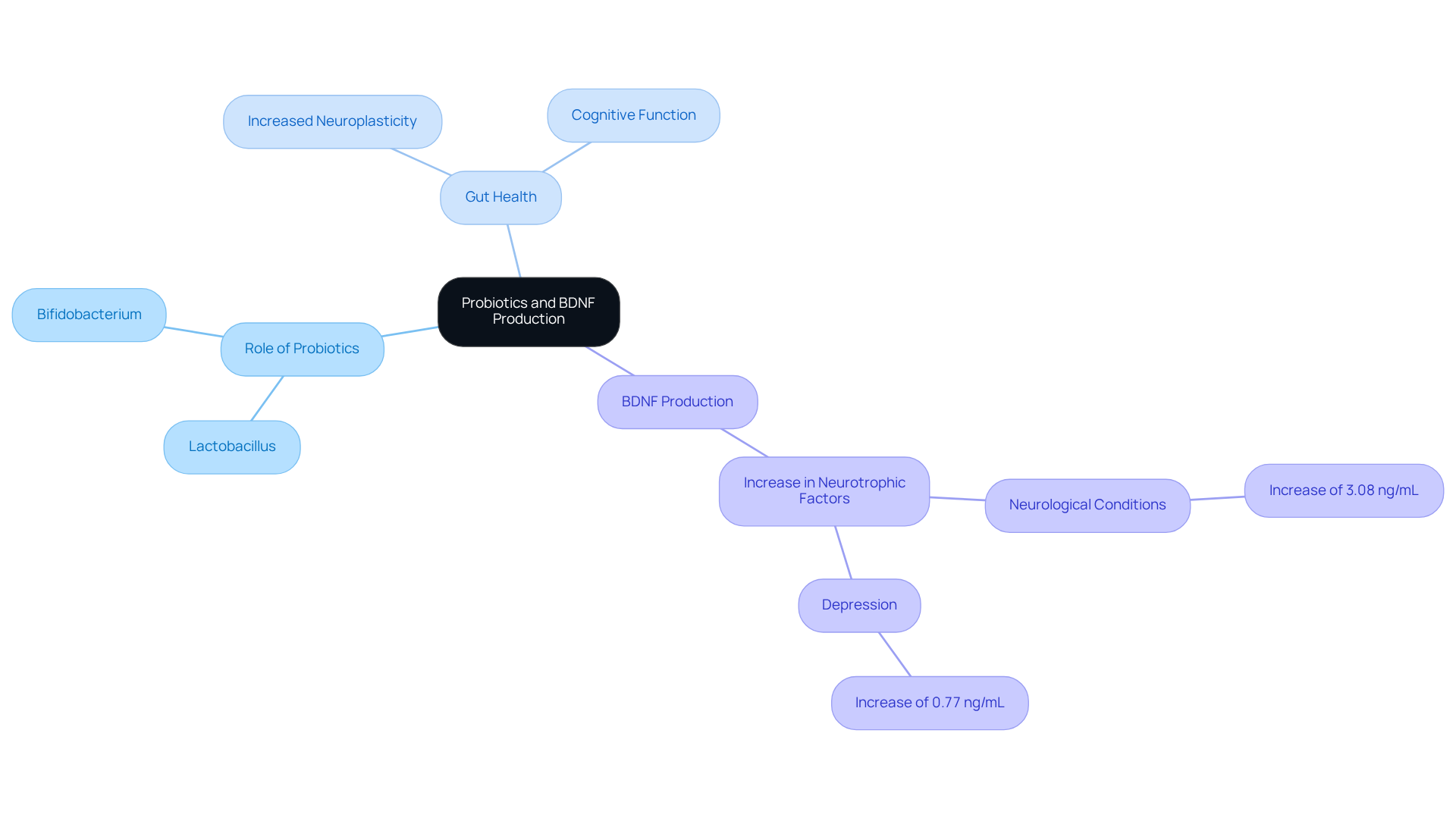
BDNF-Enhancing Supplements: Key Products for Brain Health
Multiple supplements, such as the bdnf supplement, have demonstrated efficacy in increasing brain-derived neurotrophic factor (BDNF) levels, which are essential for brain wellness and mental function. Key products include:
-
Curcumin: Renowned for its anti-inflammatory and antioxidant properties, curcumin has been shown to significantly increase BDNF levels. Research suggests that consistent use of a bdnf supplement can lead to a notable increase in serum brain-derived neurotrophic factor, with a weighted mean difference of 1789.38 pg/mL, promoting neuronal health and cognitive function.
-
Bacopa Monnieri: This traditional herb is celebrated for its cognitive-enhancing effects. Research indicates that Bacopa Monnieri not only enhances memory and learning but also acts as a bdnf supplement, increasing brain-derived neurotrophic factor levels and making it beneficial for individuals aiming to boost cognitive function.
-
Lion’s Mane Mushroom: Known for its neuroprotective properties, Lion’s Mane Mushroom has been linked to an increase in the BDNF supplement production. Studies indicate that this mushroom can enhance nerve growth factor production, supporting overall brain function and mental vitality.
Integrating bdnf supplements into your daily regimen can greatly aid brain wellness and improve cognitive function, making them crucial for anyone aiming to optimize their mental well-being. Furthermore, upholding a balanced diet, such as the Mediterranean diet, and participating in consistent physical activity can further enhance brain-derived neurotrophic factor levels. In addition, controlling chronic stress is essential for safeguarding brain wellness.
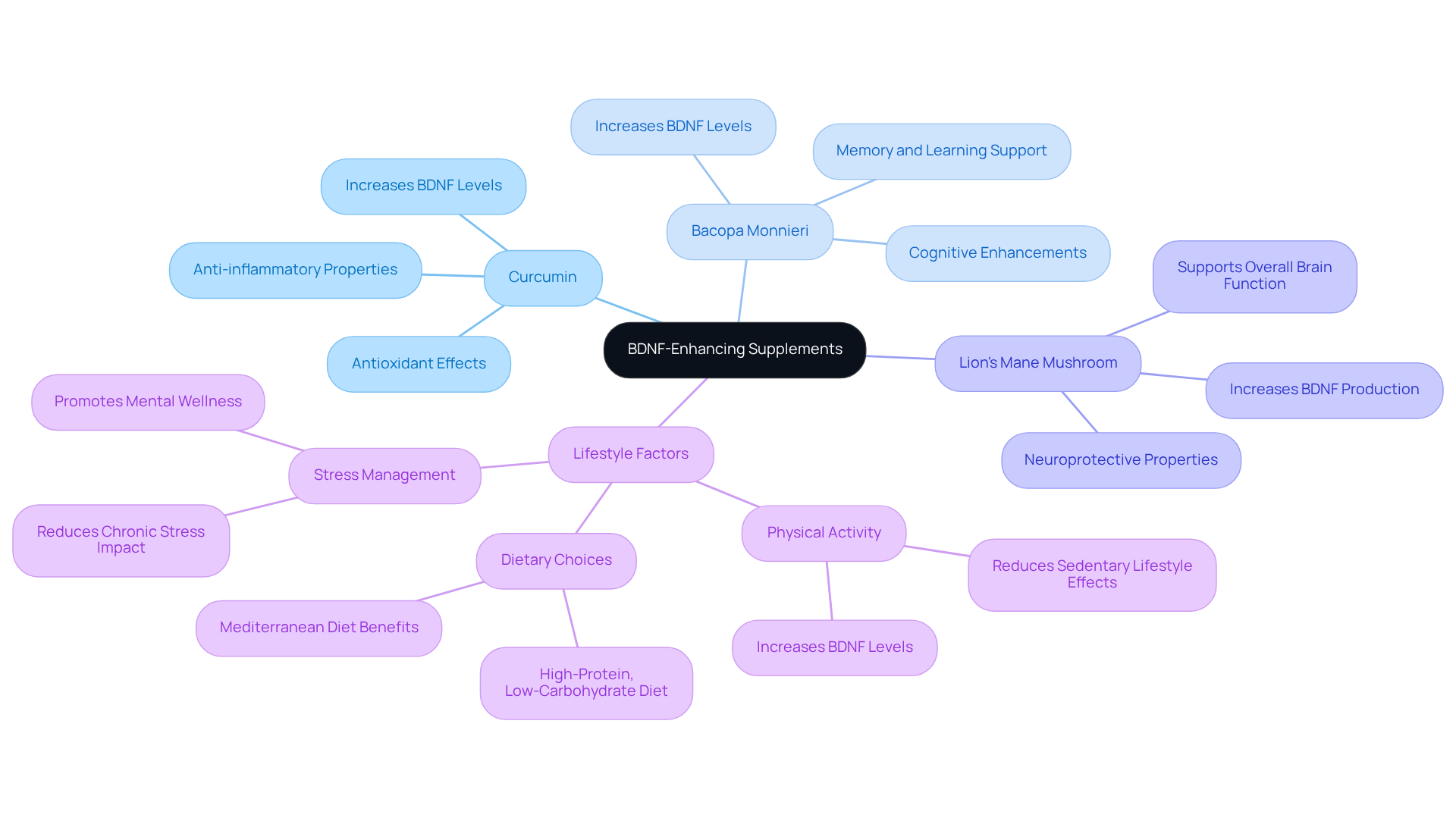
Social Engagement: Strengthening BDNF Through Meaningful Connections
Engaging in meaningful social interactions can significantly elevate the BDNF supplement levels, which are crucial for brain health. Studies suggest that social support and community engagement not only boost mental function but also enhance emotional well-being. Activities that foster these connections include:
- Joining clubs or groups: Participating in community activities that align with your interests can create a sense of belonging and stimulate cognitive engagement. Individuals with large social networks are 26% less likely to develop dementia compared to those with small networks, highlighting the protective effects of social engagement.
- Volunteering: Assisting others nurtures a sense of purpose and connection, which is essential for mental well-being and can result in increased levels of the BDNF supplement. Simply 10 minutes of daily social engagement can boost mental performance, making volunteering a practical method to enhance brain well-being.
- Enjoying moments with loved ones: Consistent social engagement is associated with lower stress, which consequently enhances mental well-being and brain function. Research indicates that socially engaged individuals encounter less deterioration in memory, supporting the mental advantages of nurturing these connections.
These social activities not only strengthen emotional resilience but also aid in increasing brain-derived neurotrophic factor amounts, especially when combined with a BDNF supplement, promoting overall brain wellness and mental performance.
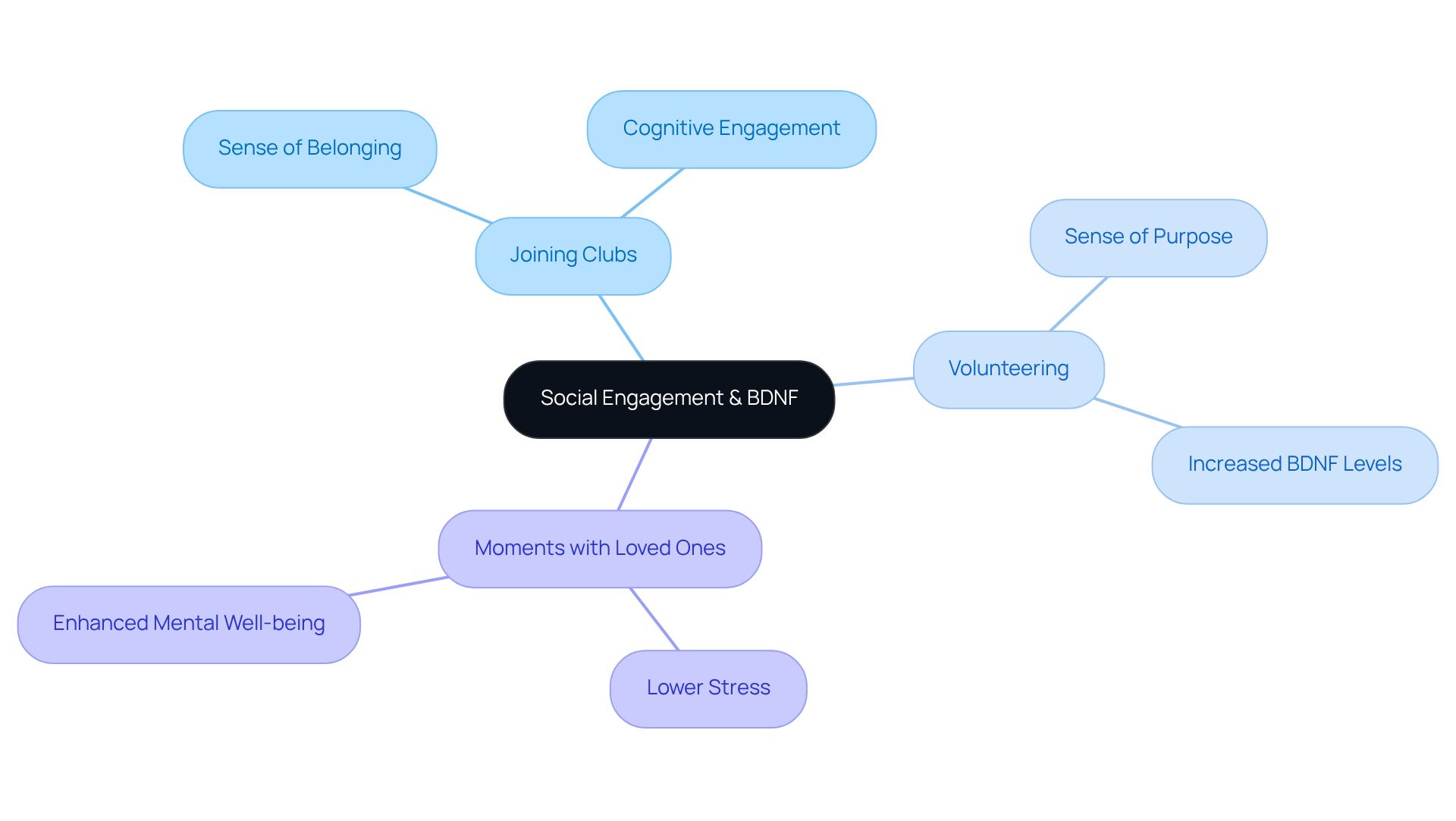
Sunlight Exposure: Natural Way to Boost BDNF Levels
Sunlight exposure serves as a powerful natural method to enhance the levels of the bdnf supplement in the brain. Research indicates that spending just 10-20 minutes outdoors each day can significantly elevate mood and cognitive abilities, as increased sunlight exposure correlates with higher levels of the bdnf supplement. To optimize your sunlight exposure, consider these strategies:
- Take walks during the day: Engage in outdoor activities during peak sunlight hours to fully benefit from natural light.
- Participate in outdoor sports: Activities such as hiking, biking, or playing sports not only extend your time in the sun but also improve physical fitness, which is beneficial for brain function.
- Consider vitamin D supplementation: If sunlight access is limited, a vitamin D supplement can help maintain optimal levels. Vitamin D is known to support mental function and stimulate the production of BDNF supplement, making it a valuable addition to your health regimen.
By incorporating these habits into your daily routine, especially during times of reduced sunlight, you can effectively boost your brain-derived neurotrophic factor with a bdnf supplement and enhance cognitive health. As specialists note, “High concentrations of a key protein are associated with enhanced memory and cognitive awareness,” underscoring the importance of these strategies.
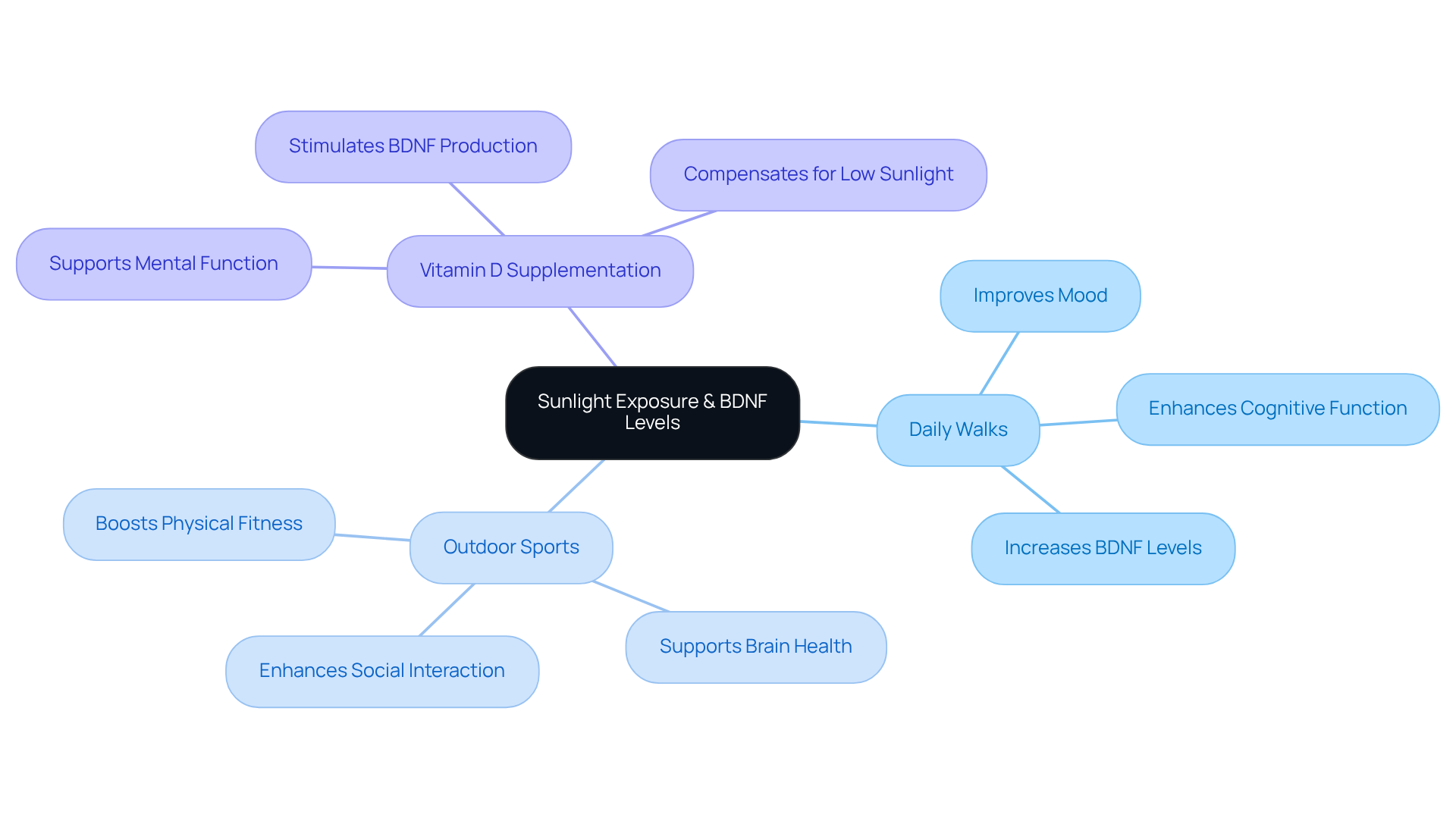
Music Therapy: Elevating BDNF Levels Through Sound
Interacting with music, whether through listening or engaging in music therapy, has been shown to significantly enhance levels of the bdnf supplement. Research indicates that music stimulates brain regions linked to emotion and cognition, thereby fostering increased neuroplasticity. For instance, a study demonstrated that participants in a music aerobic exercise (MAE) group exhibited a notable increase in BDNF levels, likely enhanced by the bdnf supplement, with a p-value of 0.042, underscoring the substantial impact of music on brain health.
To incorporate music into your daily routine effectively, consider the following strategies:
- Create Playlists: Curate playlists that not only uplift your mood but also enhance your focus during tasks.
- Participate in Music Classes: Learning to play an instrument or engaging in singing can lead to significant improvements in cognitive function and memory.
- Attend Live Music Events: Experiencing live performances offers social interaction and emotional stimulation, both of which are beneficial for mental well-being.
As Michael Greene aptly states, “Simply put, music can heal people.” By integrating music into your everyday life, you can enjoy a fulfilling and effective means of enhancing the bdnf supplement and promoting overall cognitive well-being.
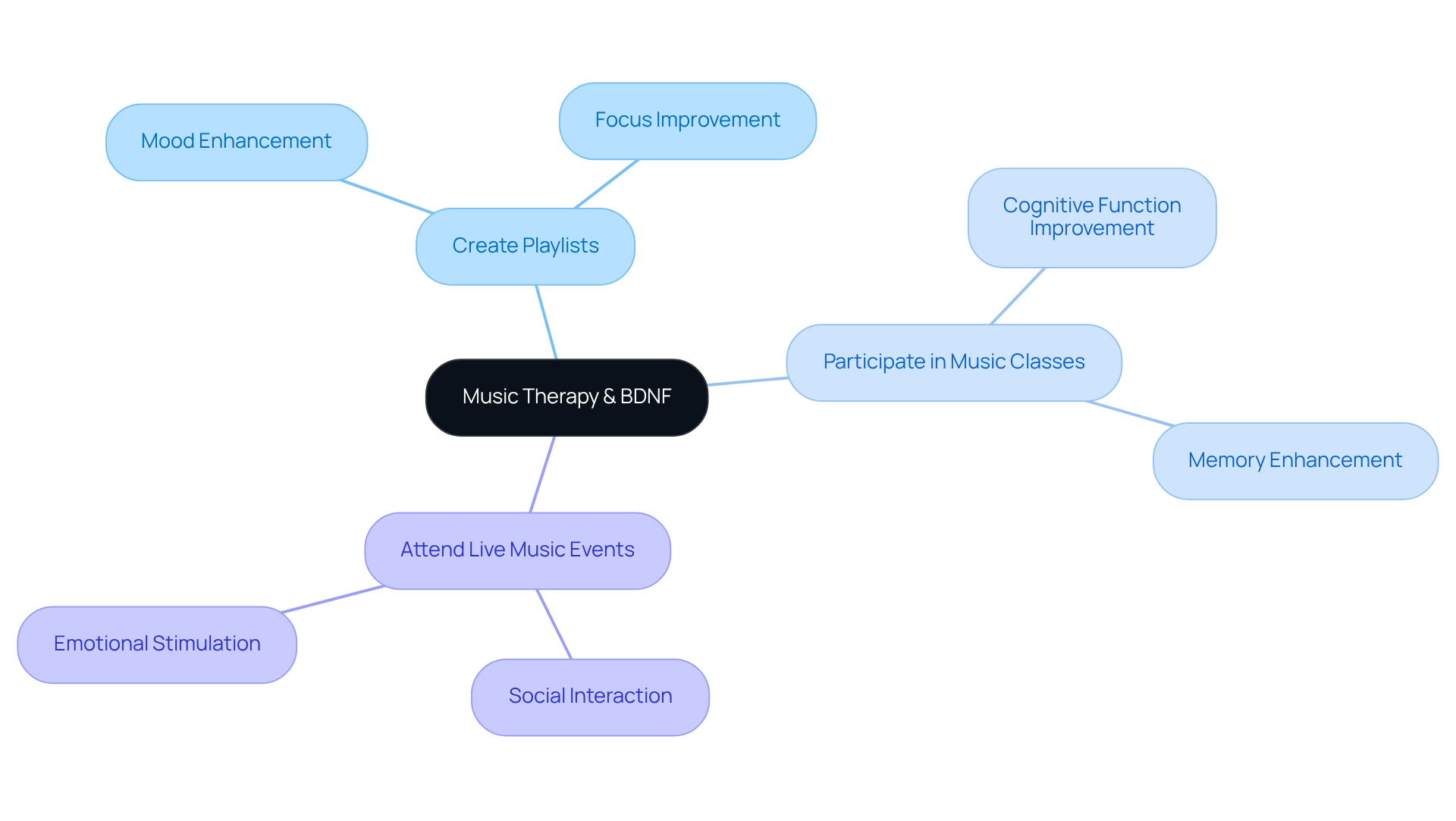
Holistic Lifestyle: Comprehensive Strategies for Sustaining BDNF Levels
To sustain optimal BDNF levels, consider adopting a holistic lifestyle that includes:
-
Balanced Nutrition: Emphasize a diet rich in whole foods, omega-3 fatty acids, and antioxidants. Foods such as fatty fish, blueberries, and dark chocolate are especially helpful for enhancing brain-derived neurotrophic factor production, which can be supported by a bdnf supplement, thus promoting mental health. Research indicates that incorporating these foods can significantly enhance brain function and resilience.
-
Regular Exercise: Incorporate both aerobic activities and strength training into your routine. High-intensity interval training (HIIT) and moderate-intensity exercise have been shown to significantly raise levels of the BDNF supplement, improving memory and cognitive function. Research indicates that participating in a minimum of 150 minutes of moderate-intensity physical activity each week can result in significant enhancements in brain-derived neurotrophic factor production.
-
Stress Management: Participate in mindfulness techniques, like meditation or yoga, to effectively decrease stress. Dr. Helen Lavretsky highlights that these practices can result in elevated brain-derived neurotrophic factor and enhanced emotional control, aiding overall brain health.
-
Adequate Sleep: Prioritize quality sleep, aiming for seven to nine hours each night. Sufficient rest is essential for mental performance and aids in removing toxins from the brain, which promotes the production of the bdnf supplement. Data show that getting sufficient sleep can significantly enhance emotional regulation and cognition.
-
Continuous Learning: Challenge your brain with intellectually stimulating activities, such as puzzles or learning new skills. Participating in these activities can enhance neuroplasticity and elevate levels of the bdnf supplement. Research indicates that continuous learning is linked to improved cognitive performance and resilience.
By integrating these strategies into your daily life, you can effectively support your brain health and maintain high BDNF levels.
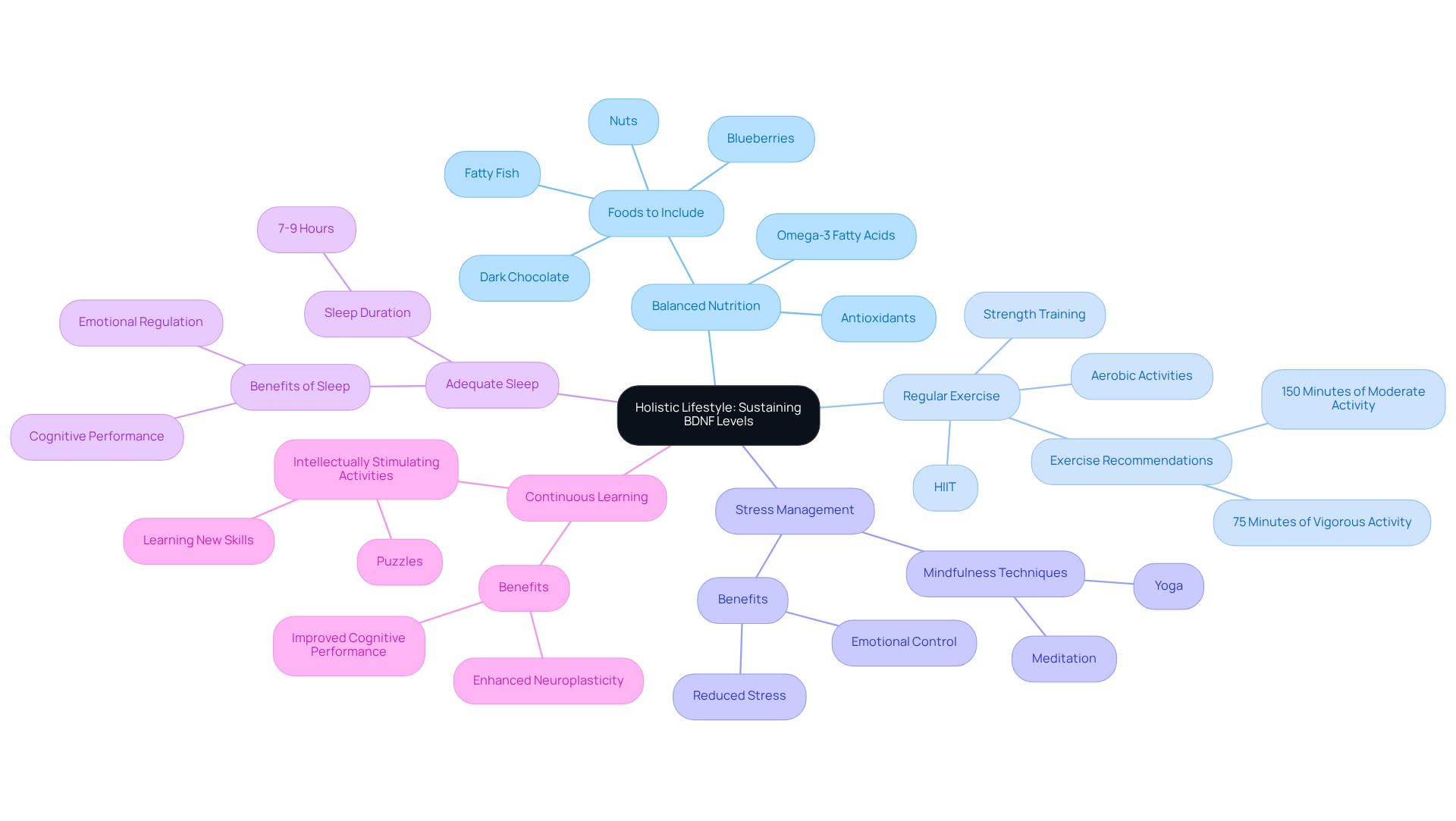
Conclusion
Incorporating effective strategies to enhance BDNF supplement effectiveness is essential for optimizing brain health and cognitive function. By focusing on a holistic approach that includes dietary choices, physical activity, and social engagement, individuals can significantly boost their brain-derived neurotrophic factor levels, which are vital for neuroplasticity and mental well-being.
Key insights highlighted throughout the article emphasize the importance of:
- Nutrient-rich foods, such as omega-3 fatty acids and probiotics
- Regular aerobic exercise
- Sunlight exposure
Furthermore, integrating supportive supplements like CLOCK® and engaging in music therapy can further elevate BDNF levels. These strategies collectively contribute to improved cognitive performance and emotional resilience, showcasing the multifaceted nature of brain health.
Ultimately, adopting these comprehensive lifestyle changes can lead to sustained BDNF levels, fostering a healthier, more adaptable brain. By prioritizing nutrition, physical activity, and social connections, individuals can take proactive steps towards enhancing their mental wellness and cognitive longevity, ensuring a vibrant and fulfilling life.
Frequently Asked Questions
What are brain-boosting meals and how do they relate to BDNF levels?
Brain-boosting meals are nutrient-dense recipes that can enhance levels of brain-derived neurotrophic factor (BDNF), which is crucial for mental health. Incorporating these meals into your diet can support cognitive function and overall brain health.
What are some examples of brain-boosting recipes from ByKomi?
Examples include:
- Savory Beef Liver Patties: Rich in vitamins A and B12, essential for cognitive function.
- Perfectly Seared Ribeye Steak: Provides high-quality protein and omega-3 fatty acids.
- Berry Smoothie: A blend of blueberries and spinach packed with antioxidants and flavonoids.
- Extra Virgin Olive Oil Drizzle: Enhances flavor and aids in BDNF production.
How does the CLOCK® dietary supplement affect BDNF levels?
The CLOCK® dietary supplement can significantly enhance BDNF levels, with a daily dosage of 1000 mg leading to a 27% increase in BDNF. This supports cognitive function and mood, making it beneficial for neuroplasticity and overall brain performance.
What role does aerobic exercise play in increasing BDNF levels?
Consistent aerobic exercise, such as running, cycling, and swimming, is one of the most effective methods to increase BDNF levels. It is recommended to engage in at least 150 minutes of moderate aerobic exercise each week to experience cognitive benefits.
Does the intensity of aerobic exercise affect BDNF levels?
Research indicates that while aerobic activity boosts BDNF levels, there is no significant link between exercise intensity and changes in resting BDNF concentration. The duration of exercise may be more critical than its intensity.
How can individual factors influence the effects of exercise on BDNF levels?
Individual responses to exercise can vary based on factors such as age, gender, and physical fitness. These variations may affect how different people experience the cognitive benefits of physical activity and BDNF supplementation.






